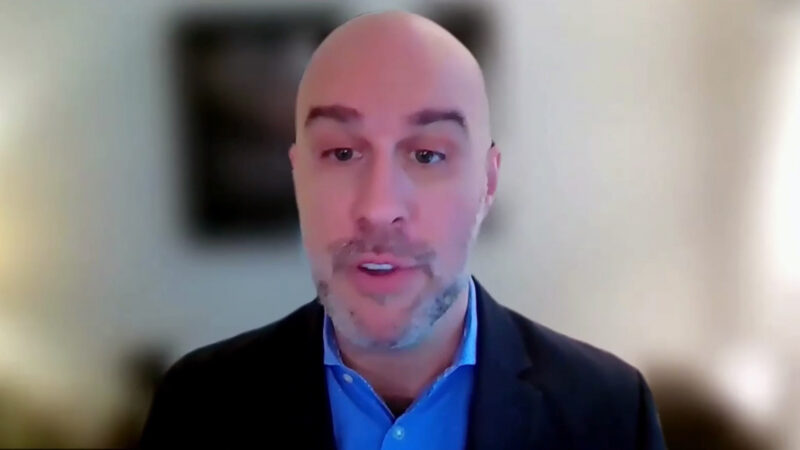Update
Alex Harman’s Statement at FTC Forum on Non-compete Agreements
02. 16. 2023
"This is a labor market distortion that ultimately drives down wages and forces workers to endure abusive conditions."

ESP Director of Government Affairs, Antimonopoly and Competition Policy Alex Harman weighed in on the FTC’s move to ban non-compete agreements in a forum hosted by the FTC on Thursday, February 16, 2023.
My name is Alex Harman, I am the Director of Government Affairs, Antimonopoly and Competition Policy at Economic Security Project, where we advocate for ideas that build economic power for all Americans.
Business and community leaders have called for an end to non-competes for many years because of how they trap workers in unfair and abusive conditions, smother competition by preventing employers from recruiting talent, and ultimately hurt economic productivity. As an organization that believes that every American should have the freedom and stability required to thrive we strongly support the pending proposal banning non-competes clauses, a proposal that will unleash the U.S. workforce in a significant way and put money back in the pockets of workers.
Today, we want to highlight three strengths of the proposed rule, these include a complete ban on non-competes, a prohibition on training repayment agreement provisions (or TRAPs), and retroactivity. In addition, we urge the Commission to strengthen the rule, and want to share three critical concerns: the rule must ensure that all TRAPs and similar contracts are included, that vertical no-poach agreements are prohibited, and that the comment period is not extended unnecessarily.
To the first point, we strongly support a total ban that does not make false or arbitrary distinctions between industries or income levels. Non-competes are an abuse of power that are designed to trap workers and prevent competition. They are indefensible and should be banned across the board. One in five workers in the US, or 30 million people, are subject to a non-compete, including low-wage workers who lack the resources to fight unjust contracts. This makes it more difficult for workers to seek better wages, working conditions, and career opportunities. It also makes it difficult for other businesses to compete for skilled workers with better pay, benefits, and opportunities who are blocked from accepting more attractive job offers. This is a labor market distortion that ultimately drives down wages and forces workers to endure abusive conditions. Importantly, when companies are forced to compete to keep their workers, evidence shows that they will offer higher wages and better working conditions to retain workers. In fact, banning non-competes could increase worker pay up to $300 billion a year, and would reduce the racial and gender wage gaps by 3.6-9.1 percent.
We are heartened by the inclusion in the rule of a ban on TRAPs.
We also strongly support making the rule retroactive, the absence of this feature would result in the 30 million US workers subject to non-competes receiving no relief.
While we applaud the proposed rule, we believe that the rule could still be strengthened in several key ways. The final rule should ban contracts that are functionally equivalent to non-compete clauses. These include TRAPs where companies require workers to pay for training received if they leave a job before a certain time period. We have seen how detrimental TRAPs can be when Kate, an airplane pilot who was “trained” to fly specific planes during scheduled flights was charged $20k by the airline just because she had to leave before the required 18 months, this despite her already having spent $80k to obtain her private pilot license. These provisions can be more harmful than traditional non-compete clauses. While non-compete clauses prevent workers from moving to a competitor or in the same occupation, TRAPs prevent workers from leaving their employer at all. This should not be limited to “reasonable” repayments because for some low-income workers even relatively small amounts of money could have the effect of locking workers in jobs they need to leave, and for workers like Kate, determining what is a “reasonable” TRAP is not easy.
Secondly, we believe that the rule should prohibit vertical no-poach agreements. These are agreements between companies and vendors that are vertically related to each other that prohibit soliciting or hiring workers across vendors. This practice is prevalent among franchises where a large franchisor will prohibit a franchisee from hiring workers from other franchisees. Workers may be aware when they are subject to a non-compete agreement, but vertical no-poach agreements are often invisible. Leinani, who had been working for ten years at a McDonalds and found herself unable to move up as a manager because a vertical no-poach agreement prevented her from moving to a store or location that could offer more opportunity for a better job.
Finally, to the third point, we encourage the Commission not to extend the comment period. For the past 4 years, the Commission has heard from numerous groups and individuals on the issue of non-competes. These include:
- A large coalition of civil society organizations, labor unions, legal experts, and economists filed a petition calling for this rule in March 2019.
- The FTC and DOJ have held multiple workshops and comments periods over the last 4 years:
- FTC Hearings on Competition and Consumer Protection in the 21st Century: Antitrust in Labor Markets (Oct. 16, 2018);
- DOJ Antitrust Division Public Workshop on Competition in Labor Markets (Sept. 23, 2019);
- FTC workshop on Non-Competes in the Workplace: Examining Antitrust and Consumer Protection Issues (Jan. 9, 2020);
- FTC and DOJ workshop on Making Competition Work: Promoting Competition in Labor Markets (Dec. 6-7, 2021): and
- FTC request for comments on contract terms that harm competition (August 2021)
There has been ample time and reams of economic and statistical studies on the effects of non-compete clauses—the evidentiary record is now clear: non-competes should be banned.
Do not make workers wait any longer for this important rule!
Thank you.